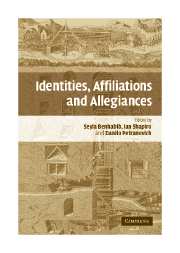Book contents
- Frontmatter
- Contents
- List of figures
- List of tables
- List of contributors
- Editors' introduction
- Part I Emergence and limits of national political identities
- 1 From affiliation to affinity: citizenship in the transition from empire to the nation-state
- 2 Transnationalizing the public sphere: on the legitimacy and efficacy of public opinion in a post Westphalian world
- 3 “Being there”: place, territory, and identity
- 4 Political boundaries in a multilevel democracy
- Part II Multiple identities in practice: the European example
- Part III Decoupling citizenship from identity
- Part IV Identity and historical injustice
- References
- Index
2 - Transnationalizing the public sphere: on the legitimacy and efficacy of public opinion in a post Westphalian world
Published online by Cambridge University Press: 05 June 2012
- Frontmatter
- Contents
- List of figures
- List of tables
- List of contributors
- Editors' introduction
- Part I Emergence and limits of national political identities
- 1 From affiliation to affinity: citizenship in the transition from empire to the nation-state
- 2 Transnationalizing the public sphere: on the legitimacy and efficacy of public opinion in a post Westphalian world
- 3 “Being there”: place, territory, and identity
- 4 Political boundaries in a multilevel democracy
- Part II Multiple identities in practice: the European example
- Part III Decoupling citizenship from identity
- Part IV Identity and historical injustice
- References
- Index
Summary
It is commonplace nowadays to speak of “transnational public spheres,” “diasporic public spheres,” “Islamic public spheres,” and even an emerging “global public sphere.” And such talk has a clear point. A growing body of media studies literature is documenting the existence of discursive arenas that overflow the bounds of both nations and states. Numerous scholars in cultural studies are ingeniously mapping the contours of such arenas and the flows of images and signs in and through them. The idea of a “transnational public sphere” is intuitively plausible, then, and seems to have purchase on social reality.
Nevertheless, this idea raises a problem. The concept of the public sphere was developed not simply to understand communication flows but to contribute a critical political theory of democracy. In that theory, a public sphere is conceived as a space for the communicative generation of public opinion. Insofar as the process is inclusive and fair, publicity is supposed to discredit views that cannot withstand critical scrutiny and to assure the legitimacy of those that do. Thus, it matters who participates, and on what terms. In addition, a public sphere is conceived as a vehicle for marshaling public opinion as a political force. Mobilizing the considered sense of civil society, publicity is supposed to hold officials accountable and to assure that the actions of the state express the will of the citizenry. Thus, a public sphere should correlate with a sovereign power.
- Type
- Chapter
- Information
- Identities, Affiliations, and Allegiances , pp. 45 - 66Publisher: Cambridge University PressPrint publication year: 2007
- 25
- Cited by



